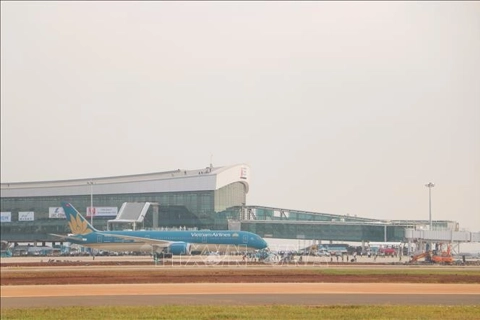Multilateralism matters a lot in controlling pandemics: Vietnam FM
Vietnam’s top diplomat addresses challenges facing humanity and joint efforts for recovery.
More than ever, it is necessary to strengthen multilateralism and international coordination to control the pandemic, Vietnam’s top diplomat said at the 15th session of the United Nations Conference on Trade and Development (UNCTAD 15).
| Vietnam's Foreign Minister Bui Thanh Son delivers a speech at UNCTAD 15 on Oct 6. Photo: MoFA |
It helps further strengthen global joint efforts to contain Covid-19 worldwide, advancing recovery and improving adaptability to the new normal, Foreign Minister Bui Thanh Son delivered a speech on Oct 6 at the event held in Barbados and Switzerland on Oct 3-7.
He stressed that multilateralism will lay the foundation for enhanced resilience against possible global shock in the future.
“It’s important to ensure timely, global, and equitable access to vaccines, especially through the sharing of vaccines and vaccine production technology to nations in urgent need,” Son said.
UNCTAD needs to work closely with multilateral mechanisms to assist developing countries in addressing challenges posed in trade and development amid supply chain disruptions in order to enhance their position in the global economy.
The Vietnamese minister’s suggestion is in line with UNCTAD 15’s spirit in which they called for vaccine equity and greater solidarity to tackle trade protectionism, debt distress, the climate crisis, and other pressing global challenges.
UN Secretary-General António Guterres reiterated his call to world leaders to tackle “the cascade of crises” facing humanity. He said the Covid-19 pandemic had wreaked havoc across the global economy, disrupting the three powerful economic engines of trade, manufacturing, and transportation.
Guterres decried the uneven economic recovery unfolding across the world. “In all, more than eight out of every ten dollars in recovery investment is being spent in developed countries — not in the countries in greatest need,” he said.
He warned that the uneven recovery was leaving much of humanity behind. “And until we get serious about vaccine equity, recovery will be stuck at the starting gate,” he said.
In addition, UNCTAD Secretary-General Rebeca Grynspan said the world stands at a critical point in the history of multilateralism amid the many challenges facing it.
Grynspan raised an alarm over the deeply divergent recovery, with advanced countries growing and vaccinating at rates many times greater than those in the developing world. “The inequalities we are witnessing in the access to vaccines and financial resources are today at the very heart of this divergence,” she said.
According to her, advanced countries are already discussing third doses, while least developed countries have only vaccinated 2% of their population.
In addition to the importance of multilateralism, Son recommended two other issues namely sustainable development and digitalization.
Accordingly, future development must be sustainable and economy, environment, and society included.
It’s essential to enhance adaptability for regions worst-hit by climate change, including the Mekong Subregion and Mekong Delta,” Son emphasized.
The last but not least, UNCTAD needs to accelerate global cooperation in innovation and digitalization for sustainable development. He said it’s paramount to provide assistance to developing countries in driving structural transformation, supporting innovation in entrepreneurship and startups, promoting small- and medium-sized enterprises (SMEs) inclusion in the digital economy.
For those reasons, Son stressed that Vietnam places people’s well-being at the heart of the policy-making process. Vietnam’s most important and urgent task is containing the pandemic and accelerating socio-economic recovery to turn challenges into opportunities.
“We’re making every effort to build momentum for rapid and sustainable development in the new normal on the basis of science and technology, innovation, and digital transformation,” he said, adding that the country expects more international support in this drive.
| UNCTAD 15 marks the participation of more than 2,000 delegates from 139 countries. |
Combined efforts
With the resolute commitment of the entire UNCTAD membership, a sustainable path forward under the conference theme “From inequality and vulnerability to prosperity for all” is expected to be achieved.
UNCTAD 15 is the largest UN event on trade and economy and the first post-pandemic global trade event marking the participation of 2,000 delegates from 139 countries. It presented an opportunity for the development community to align the 2030 UN Agenda on Sustainable Development (SDGs) with the global new normal created by the Covid-19 pandemic.
The quadrennial conference is described as the “Olympics of trade, development, investment, policy, and technology discussions” by UN Secretary-General António Guterres.
As a result, ministers have addressed the massive unmet trade, finance, investment, and technology needs of developing countries struggling in the face of the Covid-19 challenge.
Meanwhile, Secretary-General Guterres pointed out four glaring challenges namely debt distress, systems starved for investment, unfair trade, and a climate emergency, which if not addressed would make any notion of prosperity for all a distant dream.
For a sustainable and equitable recovery for all, bold investments in education, universal social protection, health care, and decent work are needed, Guterres said.
Notably, he urged countries to make bold commitments at the upcoming UN climate summit (COP26) and donors and multilateral development banks to allocate at least 50% of their climate support towards adaptation and resilience.













